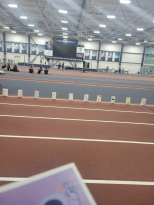Learning how how food gets from farm to fork
Dustin Gates sat back in his chair and relaxed while many of the students in his Meats Lab fidgeted on the edge of their chairs in anticipation, or averted their eyes, from what was about to happen. “I didn’t have much of an emotional reaction since I had already seen it done,” Gates said.
What he was talking about so nonchalantly, as if everyone is used to seeing it, is a pig being slaughtered.
“There was an atmosphere of excitement for those who had never experienced the process,” Gates said. Excitement over watching an animal being slaughtered may seem foreign to a non-Agricultural Sciences student, but Gates sees it as a learning experience. Knowing how to slaughter animals taught him how to commercially process animal items and better understand “how food gets from farm to fork.”
Gates grew up on a dairy farm and is a State College native in his second year in the College of Agricultural Sciences. Majoring in the business option of animal science is not something Gates just stumbled upon when he got to college. “I’ve always been interested in animals, especially dairy cows, so upon entering college this was the obvious choice for me,” Gates said.
While most kids spend their summers enjoying family vacations at the beach or making lemonade stands with their friends, growing up on a dairy farm provides some different pasttimes.
“My favorite memory of growing up on a dairy farm is taking my cows to the different shows around Pennsylvania,” Gates said.
Every summer he and his family also spent a week at the Centre County Grange Encampment and Fair with their string of cattle. The Grange Fair, as the townies call it, is a local fair at the end of August each year where people from all over Centre County camp out for the week and participate in activities from tractor pulls to showing animals to going on rides. It is unique among county fairs because hundreds of people camp out during the event in a small tent city.
Gates is a member of the Penn State Dairy Science Club and on the PSU Dairy Judging Team. Being a part of the Dairy Judging Team requires Gates to “analyze classes of dairy cows and place them according to how well they fit in with the nationally recognized standards of what the ‘ideal cow’ should look like.” The team then has to present their reasoning for placing each cow in their given class to a panel of judges from memory. The judges are looking for a high quality presentation and accurate description of the animals.
Gates also belongs to the Alpha Zeta Co-Ed Agricultural Fraternity. This honorary, professional fraternity strives for academic excellence, but according to Gates, social functions are also a large part of the experience. Walk by this fraternity on a Friday night and you probably won’t hear any Kanye or see many girls in stilettos. The more typical scene would be people in cowboy boots and the sound of Luke Bryan blaring from the basement speakers.
Undoubtedly, these parties are a good time but Gates is at Penn State for a purpose. He wants to work with bull reproduction and fertility and market genetics to dairy farmers so they can “match up the best mate” with their dairy cows.
Gates believes being a part of the College of Ag, as he calls it, will help him achieve this goal because of the numerous resources it provides for it stu0dents. “We get the opportunity to do hands-on work in and out of the classroom, with several research farms located around campus at our disposal,” Gates said. There are more than ten research farms on campus with specialties such as poultry, fungus, turf grass and deer.
“Whenever projects require information from the farms, it is easy for students to obtain the data they need and the workers at the farm are very cooperative with students,” he said.
He also said he believes the varied class offerings in his college will increase the chances of securing a job in his desired field when he graduates.
“It’s not as limited as some of the other majors on campus,” Gates said.
Within the animal science major alone students may take classes ranging from learning how to select and grade meat, to the role that pets play in society.
Gates said that any student in the College of Ag has an advantage over other students because there is a very personal experience created for their education.
“We have such an incredible staff who care about their students and are willing to help them succeed in any way possible,” he said.
Gates says anytime he sees a College of Ag staff member on campus they’ll stop and tell him about any internship, scholarship or extracurricular opportunities they know of. Sometimes they just want to know how their students are doing.
The daily schedule of this Ag student is pretty similar to that of a typical Penn State student with classes during the day and extracurricular activities at night, but class to Gates is something different than what traditionally comes to mind. His favorite class so far in his studies is called Animal Products in the Diet, which dealt with topics such as “how meat, milk and eggs are rendered and then used to nourish the body.” He got to process animal carcasses and learn how to cut and package them for retail sale. His favorite lab though, was the one where his class got to make omelets at the end of the class to learn about the properties of eggs and the chemical changes that occur during the cooking process.
Watching a pig get slaughtered and getting credit for it may not be part of a typical education, but Gates’ unique activities like this are part of what makes the College of Agricultural Sciences so interesting.
“My favorite thing about being in the College of Ag Sciences is the fact that it’s not just a lecture day after day,” he said.
(This story was written for Comm260w News Writing.)







